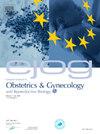姜黄素胶囊对学生原发性痛经严重程度和持续时间的影响:伊朗西部的一项三盲随机对照试验
IF 1.7
Q3 OBSTETRICS & GYNECOLOGY
European Journal of Obstetrics and Gynecology and Reproductive Biology: X
Pub Date : 2025-09-08
DOI:10.1016/j.eurox.2025.100427
引用次数: 0
摘要
本研究旨在评价姜黄素胶囊对原发性痛经严重程度和持续时间的影响。方法采用随机对照试验方法,于2024年在哈马丹医科大学招收符合预定入选标准的女大学生,每组34人。在干预组中,参与者服用含有500 毫克姜黄素的姜黄素胶囊。这些胶囊在两个月经周期内每天服用一次。对照组服用含有500 毫克淀粉的安慰剂胶囊,给药方法与干预组相同。数据收集工具包括人口统计学特征问卷、视觉疼痛量表、疼痛持续时间和多维语言量表。结果干预后出现显著差异(P <; 0.001)。干预组痛经严重程度从第一个月经周期的平均6.5-4.53明显下降,第二个月经周期进一步下降到3.44。相比之下,对照组无明显变化。干预组的改善在两个周期中是一致的,突出了干预在减轻痛经严重程度方面的有效性(P <; 0.001)。结论姜黄素胶囊可作为减轻原发性痛经严重程度和病程的一种有效、低风险的辅助治疗方法。本文章由计算机程序翻译,如有差异,请以英文原文为准。
The effect of curcumin capsule on the severity and duration of primary dysmenorrhea among students: A triple-blind randomized controlled trial in the West of Iran
Background
The present study was conducted to evaluate the efficacy of curcumin capsules on the severity and duration of primary dysmenorrhea.
Methods
A randomized controlled trial conducted among female students at Hamadan University of Medical Sciences who met predetermined inclusion criteria in 2024 at 34 participants per group. In the intervention group, participants received curcumin capsules containing 500 mg of curcumin. These capsules were ingested once daily over the course of two menstrual cycles. The control group was administered placebo capsules, which contained 500 mg of starch, with the method of administration mirroring that of the intervention group. Data collection tools were including demographic characteristics questionnaire, visual pain ruler, pain duration and multidimensional verbal scale.
Results
after the intervention, a significant difference emerged (P < 0.001). In the intervention group, dysmenorrhea severity decreased significantly from a mean of 6.5–4.53 in the first menstrual cycle and further reduced to 3.44 in the second cycle. In contrast, the control group showed no significant change. The intervention group's improvement was consistent across both cycles, highlighting the effectiveness of the intervention in reducing dysmenorrhea severity (P < 0.001).
Conclusion
curcumin capsules can be used as an effective and low-risk complementary treatment for reducing the severity and duration of primary dysmenorrhea.
求助全文
通过发布文献求助,成功后即可免费获取论文全文。
去求助
来源期刊

European Journal of Obstetrics and Gynecology and Reproductive Biology: X
Medicine-Obstetrics and Gynecology
CiteScore
2.20
自引率
0.00%
发文量
31
审稿时长
58 days
 求助内容:
求助内容: 应助结果提醒方式:
应助结果提醒方式:


